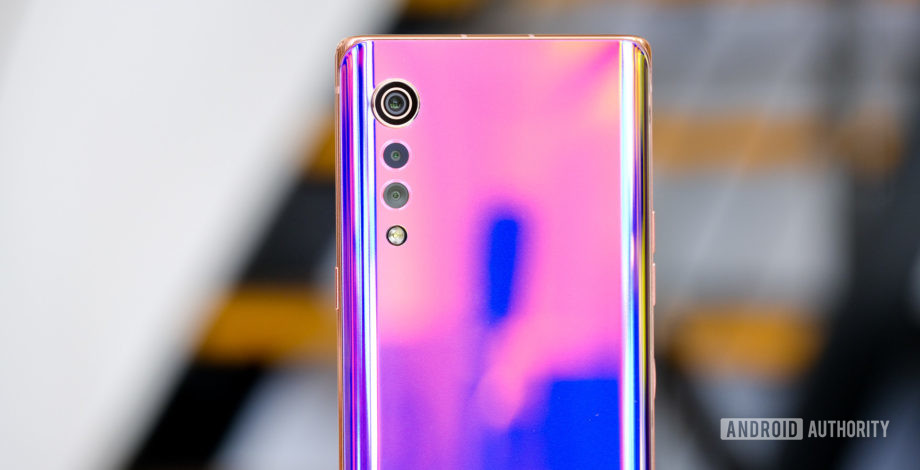
2020’s LG Wing and LG Velvet flagship handsets may not have been breakout successes, but they marked a new innovative approach to smartphone design from the legacy manufacturer — one where style and form factor takes precedent, but the specs are pretty good too.
With the G series’ constant strugglee for success, a change in direction was inevitable. The Velvet was a solid breakaway handset, although it may not have quite placated G series fans’ appetite for cutting edge hardware. That market is now entirely catered for by the V series, the latest of which is the LG V60. Meanwhile, the LG Wing is a new outlet for the company’s more experimental street.
LG’s first stylish successor to the G series piqued our interest and we have a few wishes on our list for the LG Velvet 2.
Another unique take on smartphone-style

The LG Velvet is a great looking smartphone. There’s no doubt about that. It’s super thin at just 7.9mm deep, yet still manages to pack in a large battery. It also features a headphone jack and a dedicated Google Assistant key. This blend of core specs and a fashion first approach is the Velvet’s unique selling point. We definitely want to see that stay as the core focus with the Velvet 2.
Of course, styles change over time and we certainly wouldn’t turn down a few tweaks to keep the phone looking fresh. Notched front camera housings, for example, are a little dated in 2021. We also liked the wide range of color options that the original Velvet came in. A couple of extra colorways and/or a new option or two for the back finish would continue to play to the Velvet’s strength of choice.
Don’t miss: A guide to LG phones: What you need to know
An updated phone that continues to offer LG’s solid combination of style and hardware could be a real winner. LG knows how to build eye-catching smartphones, and we definitely want to see the Velvet 2 continue to stand out from the crowd.
Faster charging, please

Our LG Velvet review unit took two full hours to top up. That’s painfully slow by modern standards, even for a more affordable handset. It was one of our biggest gripes about the phone.
The 18W charger included in the box is disappointing slow. Ideally, we’d like to see 30W to 40W charging offered as standard, which should see the phone charge up in around an hour rather than two. That speed is perfectly achievable using the latest Qualcomm Quick Charge and USB Power Delivery protocols.
While we’re at it, we’d like to see faster wireless charging make its way to the LG Velvet 2 as well. The LG V60 showcased the company’s 25W wireless charging efforts and was pretty fast to charge from the dock as a result. Cost permitting, this would be a great addition to the Velvet 2’s charging capabilities. Failing that, the 12W option found in the LG Wing should be the next-gen baseline speed.
Improved performance or drop the dual-screen

2020 proved that you don’t have to offer bleeding-edge performance to build a great smartphone. See the Google Pixel 5 or OnePlus Nord as just two examples. Yet, we weren’t completely convinced by the performance of the LG Velvet and its Qualcomm Snapdragon 765G processor.
The phone just didn’t feel quite as snappy as other flagship handsets, and we noticed the odd delay and stutter. Not enough to be a deal-breaker, but it’s something we’d like to see LG address. This could be something as simple as optimizing the operating system and its additional software features. As we’ve seen other 765G smartphones run pretty much flawlessly.
Read more: The best LG phones you can buy
Failing that, an upgraded processor might be the required solution. Nevertheless, Qualcomm is yet to announce a successor to its super mid-tier 765G processor. We’d rather the LG Velvet 2 remain at a competitive price point. A last-gen flagship processor, rather than the cutting edge Snapdragon 888, might strike the right balance. But those are hard to come by and aren’t the best pick if you want long-running Android updates.
Performance might be the toughest point for the Velvet 2 to balance. If the company sticks with another mid-range processor, LG shouldn’t be overly ambitious with the phone’s performance capabilities. Ideas like the company’s dual-screen case are fine on paper, but mid-range chipsets struggle to drive multiple displays with the level of performance that consumers expect. Drop the idea from the Velvet 2 and focus on nailing a flawless single-screen experience first.
More competitive cameras

Credit: David Imel / Android Authority
Rounding out our gripes from recent LG smartphones leaves us with the camera. The company’s phones have been a little behind the photography curve for a number of years, and it’s time the manufacturer caught up.
LG’s combination of a main, depth, telephoto, and wide-angle sensor is fairly typical of what you’ll find across the industry in terms of flexibility. But our experience indicates that LG’s choice of small image sensors is hindering light capture and image quality, particularly in low light. Newer, larger sensors would certainly help it compete with some of the higher-profile handsets on the market. However, bigger sensors and wider lens apertures will have implications for LG’s camera housing design.
Did you know: The LG V40 opened the era of modern triple camera phones
As such, we’re not expecting LG to jump right to the cutting edge of camera hardware. Especially given the Velvet’s more affordable approach to pricing. However, photography is hugely important to most consumers and a sure-fire way to earn praise from industry pundits. After all, if you want to be considered a rival to Apple and Samsung, you have to take photos that look just as good.
A high refresh rate display

This one is a super simple request — a 90Hz display at the very minimum next-generation, please.
90Hz and 120Hz displays are standard in 2021’s smartphone industry. Even more affordable models from 2020 boast 90Hz displays, offering smoother scrolling through apps and making use of higher frame rates when gaming. Even if this breaks compatibility with LG’s existing dual-screen accessory, we’d view it as a worthwhile trade-off.
We can’t imagine the LG Velvet 2 will miss out on a high refresh rate display this time around. But it’s on our list, just in case.
LG Velvet 2 pricing stays the same

At launch, the LG Velvet’s $599 price tag was a bit of a contentious issue. Many felt the phone didn’t represent the best value for money on the market, especially those focused on specifications. The phone’s price did land it in an odd spot. It was not quite as affordable as the OnePlus Nord or Google Pixel 4a and not too much cheaper than phones like the OnePlus 8 or the standard Galaxy S20.
The Velvet’s price actually turned out to be close to a sweet spot later in the year, which opened up with the arrival of the $700 Samsung Galaxy S20 FE. Samsung’s late entry has shaken up what counts as a bargain flagship phone. It has helped rejuvenate the market segment that falls just below the usual flagship price points.
It feels like this was the market the LG Velvet was after all along, but the phone didn’t quite nail the value proposition as well as the Galaxy S20 FE did. With that in mind, we’d like to see the Velvet 2 focus on driving hardware improvements forward while sticking around the $600 price point. LG has little chance of succeeding against affordable phones in the sub $500 market, nor winning the battle of the $1,000 super brands either. But as the Galaxy S20 FE has shown, a bargain flagship done right can turn out to be one of the best smartphones of the year.
What do you want to see from LG’s next stylish smartphone? Selection an option from the poll below. Or if there’s something else you’re eager to see from the LG Velvet 2, sound off in the comments below.
 Loading poll
Loading poll
Tech journalist with over a 8 years of experience in the industry. With a passion for gaming and cutting-edge technology, I have been a driving force behind bestgamingpro.com, delivering in-depth tech updates and comprehensive product reviews. My expertise spans various tech domains, including gaming hardware, software, and emerging technologies.
